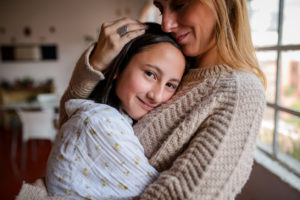3 Levels of Behavioral and Mental Health Treatment for Children and Teens

Children and teens go through important developmental stages and experience changes with their bodies, moods, interests, social groups, etc. They’re also trying to understand their complex feelings and learning how to manage new or confusing emotions. As a parent or caregiver, knowing the types of mental health treatment available for children and teens can help put your child on the path to mental health wellness.
On a given day, children and teens can face many of the same emotional struggles as adults, including sadness, self-doubt, anger, guilt, worry and much more. But children are not as equipped to understand how to respond to these feelings in a healthy way. When youth experience difficult emotions and hardships, the help and guidance of a caring counselor or therapist can have many positive, long-lasting benefits.
KVC has created a new guide to inform you about some of the most common forms of counseling, therapy and mental health treatment available for children and teens and how to find them. It also helps you understand the types of professional help you may want to explore depending on your child’s level of need. While various types of treatment are discussed in this guide, it’s important to work with a licensed professional to determine what’s best for your child and family.
Below are quick overviews of some of the most common types of counselors and mental health treatment available for children and teens. You can click here to download the full guide for more information.
For General Life Stress or School-Related Stress: School and Pastoral Counseling
The demands of daily life, including school-related stress, can take a toll on your child’s mental health and wellbeing. Children and teens often exhibit signs of this type of stress in the following ways:
- Low self-esteem
- Bullying
- Poor school performance
- Classroom disruptions
- Other behavioral challenges
If you’ve noticed your child struggling with one of more of these behavioral challenges, a school counselor, social worker or pastoral counselor can be a great place to start for help.
For More Specific Mental Health Needs: Licensed Mental Health Professionals
 If your child’s needs exceed what a school or pastoral counselor can help with, is outside of their expertise, or if your child has a mental health diagnosis or potential diagnosis, the help of a licensed mental health professional is necessary.
If your child’s needs exceed what a school or pastoral counselor can help with, is outside of their expertise, or if your child has a mental health diagnosis or potential diagnosis, the help of a licensed mental health professional is necessary.
When deciding which type of professional is best suited to help your child, start by talking to your child’s pediatrician or primary care physician. They can perform a physical exam and ask about their symptoms to begin investigating whether there are physical problems that can be causing the symptoms. They can help you decide what type of mental health professional is best for your child and determine if health insurance or other methods can be used to cover the cost of treatment.
Some of the most common types of mental health professionals include:
- Licensed Clinical Social Worker (LCSW)
- Licensed Specialist Clinical Social Worker (LSCSW)
- Licensed Professional Counselor (LPC)
- Licensed Marriage and Family Therapist (LMFT)
- Psychologists
- Psychiatrists
When Safety is a Concern: Hospitalization or Residential Treatment
When a child or teen is coping with severe emotional, behavioral or mental health challenges, it may be necessary to seek higher levels of care. These types of care include inpatient acute hospitalization or residential treatment. When receiving these types of care, children reside in a treatment center where they receive 24-hour supervision to keep them safe.
Common diagnoses for children or teens admitted into this spectrum of care include:
- Major depression
- Generalized anxiety disorder
- Post-traumatic stress disorder
- Bipolar disorder
- Attention deficit hyperactivity disorder (ADHD)
- Substance use disorders
- Oppositional defiant disorder
- Self-harm
- Thoughts of or attempted suicide
Hospitalization or residential treatment should be pursued when community-based options have been explored and are not successfully meeting the child’s health and safety needs or if the child is in need of immediate stabilization due to a severe psychiatric concern.
Finding the Support You Deserve

There are many types of treatment available and finding the right one for your child or teen is important. Speak with your physician, local community health center, school counselor, or a mental health professional to address concerns and receive guidance.
We offer a range of behavioral health services which are designed to promote healthy brain development, build resilience, and help our clients learn healthy skills to manage difficult emotions and move forward into a healthier and happier future. If you would like to talk to someone about receiving inpatient or residential mental health services, contact Camber Children’s Mental Health (previously KVC Hospitals) at (913) 890-7468 or visit cambermentalhealth.org.
If you or someone you know is experiencing thoughts of suicide and/or self-harm, please call 911 or the Suicide and Crisis Lifeline at 988.
